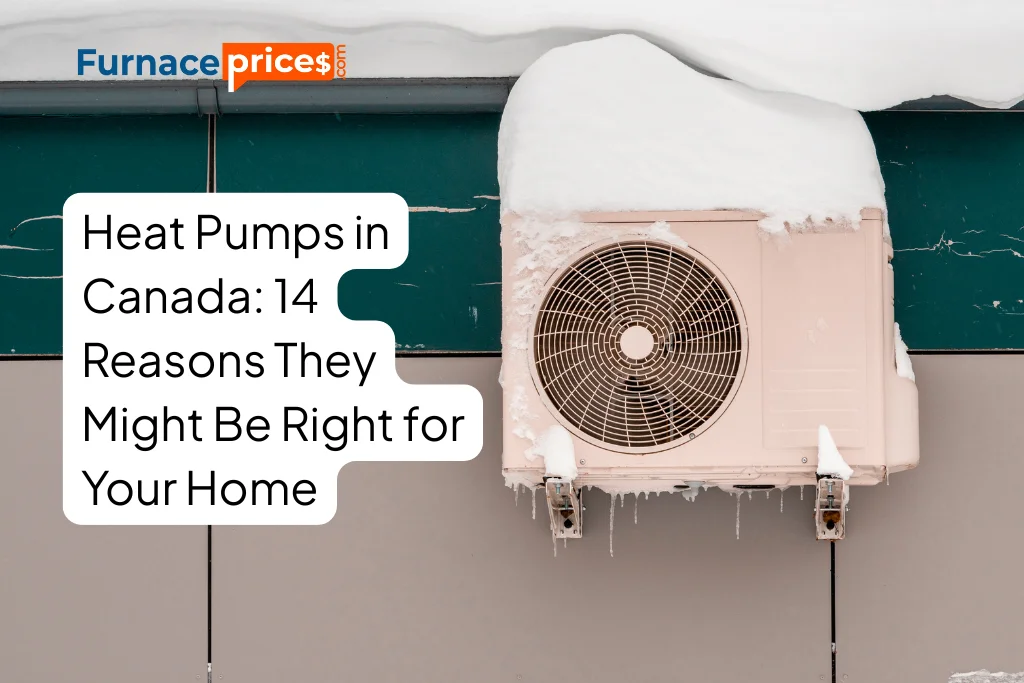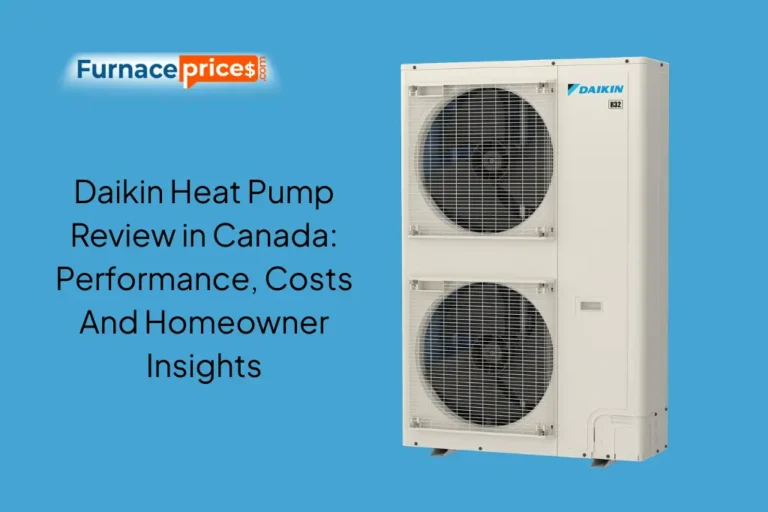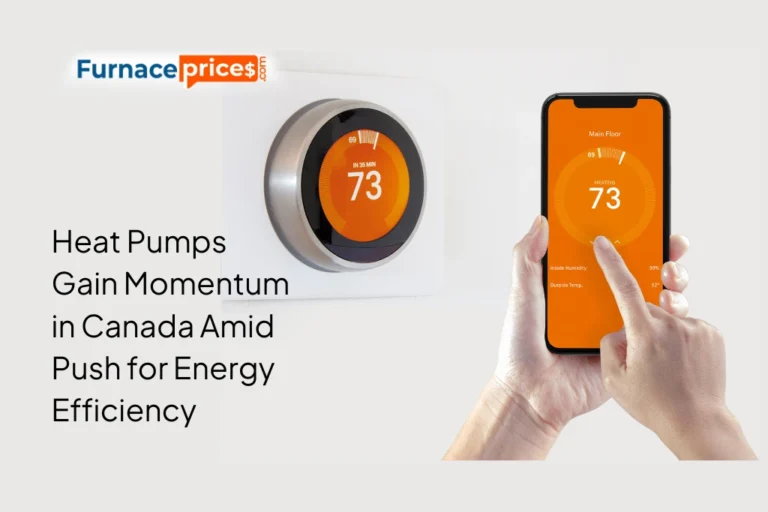Heat Pumps in Canada have grown in popularity as an energy-efficient and environmentally responsible option for heating and cooling homes. These systems provide a versatile solution that helps maintain comfortable indoor temperatures throughout the year, while also offering the potential to lower your monthly energy bills.
If you’re a homeowner in Canada, especially in Ontario or other provinces with cold winters, you may be asking yourself: Are heat pumps really worth the investment here?
This article explores the many benefits of heat pumps in Canadian climates, addresses common concerns, and highlights important factors to consider when deciding if a heat pump is the right choice for your home.
Are Heat Pumps a Good Choice for Canadian Homes?
Canada’s climate presents a unique challenge when it comes to heating and cooling. With long, cold winters and warm summers in some regions, having a reliable, efficient HVAC system is critical for comfort and cost savings. Heat Pumps in Canada have emerged as a popular choice across many Canadian households, offering an energy-efficient solution that works year-round—but is that enthusiasm justified?
The short answer is yes—heat pumps are a smart choice for Canadian homes, and here’s an in-depth look at why.
1. Heat Pumps Offer Excellent Energy Efficiency
One of the strongest arguments in favor of heat pumps is their outstanding energy efficiency. Unlike traditional furnaces or boilers, which burn fuel (natural gas, oil, or propane) to generate heat, heat pumps operate by transferring heat from one place to another using electricity. This process requires significantly less energy.
To put it simply, heat pumps don’t create heat; they move it. In colder months, they draw heat from the outside air—even when it’s very cold—and transfer it indoors. In warmer months, they reverse the process to cool your home by moving heat from inside to outside.
This technology allows heat pumps to provide three to four times more heating energy than the electrical energy they consume. In practical terms, that means you get much more heat for every dollar you spend on electricity, which can lead to big savings on your energy bills.
For Canadian homeowners, especially in provinces like Ontario where electricity prices can be reasonable, this efficiency makes heat pumps a particularly attractive option. The better your home is insulated and sealed, the more effective your heat pump will be, maximizing those savings.
2. Long-Term Financial Benefits
While heat pumps usually require a higher initial investment than traditional heating systems, the long-term savings are often worth it.
Energy efficiency translates directly into lower utility bills. Many homeowners see noticeable reductions in their monthly heating and cooling costs, which can add up over several years. In addition, heat pumps generally have lower maintenance costs because they have fewer moving parts and don’t rely on combustion processes, which can wear out components faster.
Canada’s federal and provincial governments recognize the importance of energy-efficient home heating and offer various grants, rebates, and incentives that can help offset the upfront purchase and installation costs. For example, the Canada Greener Homes Grant program provides financial support for eligible homeowners installing heat pumps, which significantly reduces the financial burden.
When you consider the combination of lower energy bills, reduced maintenance, and government incentives, the overall cost of ownership of a heat pump often compares favourably to traditional heating systems over a 10-15 year period. This makes heat pumps a cost-effective choice, especially for those planning to stay in their homes for the long term.
3. Heating and Cooling in One System
One of the most practical benefits of a heat pump is that it provides both heating and cooling, making it an all-in-one HVAC solution.
In summer, a heat pump works like an air conditioner by moving heat out of your home to keep it cool. In winter, it reverses direction to bring heat inside. This dual capability eliminates the need to install separate systems, which not only saves on equipment costs but also reduces space requirements.
For Canadian homeowners, this means one system can handle your climate’s seasonal extremes, simplifying maintenance and system management. Instead of coordinating different service providers or dealing with multiple warranties, you have a single, streamlined solution.
Moreover, modern heat pumps come with programmable thermostats and smart home compatibility, so you can adjust temperatures remotely or set schedules to optimize comfort and efficiency year-round.
4. Cold Climate Heat Pumps Work Well in Canadian Winters
For a long time, heat pumps were thought to be unsuitable for very cold climates, limiting their appeal in places like Ontario or further north. However, technological advances have changed the game.
Today, cold climate heat pumps are designed to operate efficiently in temperatures as low as -25°C or even lower. They achieve this through enhanced compressors, improved refrigerants, and better insulation and defrost cycles, enabling them to extract heat from the outdoor air even when it’s frigid.
This means many Canadian homeowners can rely on heat pumps as their primary heating source, even during the coldest months. While extremely cold conditions may still require supplemental heating, the vast majority of winter days can be comfortably managed by a properly sized cold climate heat pump.
Natural Resources Canada supports this technology as a viable heating option, and many homeowners have reported satisfaction with the performance and reliability of cold climate heat pumps in their Canadian homes.
5. Environmentally Friendly Heating Option
With the increasing focus on reducing carbon footprints and tackling climate change, heat pumps offer an eco-friendly alternative to fossil fuel-based heating.
Traditional natural gas or oil furnaces produce greenhouse gases when they burn fuel. Heat pumps, on the other hand, use electricity to transfer heat, resulting in far lower carbon emissions—especially when paired with electricity from renewable sources such as hydro, wind, or solar.
Research shows that heat pumps can reduce carbon emissions by up to 65% compared to conventional heating systems. This is a significant environmental benefit, particularly for Canadian provinces working toward greenhouse gas reduction targets.
Choosing a heat pump helps you do your part in reducing air pollution and dependence on fossil fuels. It also protects you from the volatility of fossil fuel prices, which can fluctuate dramatically due to market forces and geopolitical events.
6. Low Maintenance Requirements
Heat pumps are known for their reliability and relatively low maintenance needs.
Because they don’t rely on combustion, many common furnace problems such as pilot light issues or cracked heat exchangers are eliminated. Heat pumps generally have fewer moving parts, which reduces the chances of mechanical failure.
Basic maintenance for heat pumps typically involves changing or cleaning filters regularly, ensuring the outdoor unit is clear of debris and snow, and having an annual professional inspection to check refrigerant levels and system components.
This means less hassle for homeowners and lower ongoing service costs compared to conventional systems, which may require more frequent and costly repairs.
7. Quiet Operation
Another advantage of heat pumps is their quiet performance.
Indoor units are designed to operate with minimal noise, providing a comfortable and peaceful home environment. Unlike some traditional systems that can produce loud bangs or constant blower noise, heat pumps are often described as whisper-quiet.
The outdoor unit makes some noise, but it’s generally a soft hum or gentle fan sound, which most homeowners find unobtrusive. You can also position outdoor units strategically to minimize any noise disturbance.
This quiet operation is especially appreciated in dense neighbourhoods or smaller properties where noise can be a concern.
8. Easy to Retrofit
If you’re thinking about upgrading your current heating system, heat pumps are a practical option even for retrofit projects.
Rather than tearing out your entire HVAC system, a heat pump can often be integrated with your existing ductwork or installed as a ductless mini-split system for homes without ducts.
Retrofitting heat pumps is usually less disruptive and can be completed in a shorter time frame than installing a full new HVAC system, making it a convenient upgrade path.
This flexibility allows homeowners to transition gradually to more energy-efficient heating without the need for major renovations.
9. Eligible for Canada Greener Homes Grant
Canada’s federal government supports energy-efficient home upgrades through the Canada Greener Homes Grant program.
Under this initiative, eligible homeowners can receive up to $5,000 to help cover the cost of installing heat pumps and other energy-saving renovations. This grant significantly reduces the financial barrier to adopting modern HVAC technologies.
Provincial programs and local utility rebates may also provide additional incentives depending on where you live.
By taking advantage of these financial supports, you can reduce your upfront costs and improve your home’s energy efficiency at the same time.
10. Combine Heat Pumps with Solar for Greater Savings
For homeowners interested in maximizing savings and sustainability, pairing a heat pump with solar panels is a winning combination.
Solar panels generate electricity that can be used to power your heat pump, reducing your reliance on grid electricity and lowering your overall energy bills.
This setup not only improves your home’s environmental footprint but also offers protection against rising energy costs over the long term.
With advances in battery storage technology, you can store excess solar energy for use when the sun isn’t shining, further enhancing your home’s energy independence.
11. Heat Pumps Can Work Without Ducts
Many older homes or homes without existing ductwork face challenges when upgrading heating and cooling systems.
Heat pumps offer a solution through ductless systems, often called mini-splits. These systems heat and cool individual rooms or zones without the need for ducts.
Ductless heat pumps provide excellent temperature control, allowing you to customize comfort in different parts of your home and save energy by not heating or cooling unused areas.
This flexibility makes heat pumps accessible for a wider range of homes, including apartments, cottages, and older houses.
12. Year-Round Comfort and Flexibility
Heat pumps aren’t just about heating—they offer consistent comfort throughout the year.
In Canada’s climate, where temperatures can swing dramatically between seasons, having a system that can seamlessly switch from heating to cooling is a big advantage.
With modern controls and smart thermostats, you can set precise temperatures and schedules, ensuring your home is always at the right comfort level without wasting energy.
13. Improved Indoor Air Quality
Beyond temperature control, heat pumps contribute positively to indoor air quality.
Combustion heating can dry out indoor air, aggravating respiratory problems and causing discomfort. Heat pumps, however, maintain balanced humidity levels, creating a healthier indoor environment.
Additionally, heat pumps typically include effective air filtration that removes dust, pollen, pet dander, and other allergens from the air. This can make a noticeable difference for households with allergy or asthma sufferers.
14. Potential Downsides of Heat Pumps
While heat pumps offer many benefits, it’s important to understand some potential drawbacks.
The initial cost of purchasing and installing a heat pump is generally higher
than traditional furnaces. Installation complexity, especially for ducted systems, can add to this cost.
In very cold climates, a backup heating source may still be required to supplement the heat pump during extreme cold snaps. This is less of an issue with newer cold climate models but worth considering depending on your location.
Some homeowners may find that their electricity rates make heat pump operation less economical compared to natural gas heating. It’s wise to assess local energy costs before committing.
Things to Keep in Mind When Choosing Heat Pumps in Canada
1. Home Heating Load and Size
Proper sizing is critical for heat pump performance.
If the unit is too small, it won’t adequately heat or cool your home, resulting in discomfort and excessive wear on the system. If it’s too large, it will cycle on and off frequently, reducing efficiency and increasing costs.
A professional heating load calculation, which takes into account your home’s size, insulation, window quality, and climate zone, will help determine the right capacity.
2. Efficiency Ratings and Compressor Types
When shopping for heat pumps, pay attention to efficiency ratings such as HSPF (Heating Seasonal Performance Factor) and SEER (Seasonal Energy Efficiency Ratio).
Higher ratings indicate better performance and lower operating costs.
Inverter-driven compressors, which adjust speed based on heating demand, offer smoother temperature control and greater efficiency compared to traditional single-speed compressors.
3. Insulation and Duct work Condition
A heat pump’s efficiency depends heavily on your home’s insulation and duct work.
Well-insulated homes retain heat longer, reducing the load on your system.
If your heat pump uses ducts, make sure they are sealed properly and insulated to avoid energy loss.
4. Budget and Incentives
Heat pump prices range widely—from about $3,000 for basic ductless mini-splits to $10,000 or more for large, whole-home ducted systems with advanced features.
Installation costs can vary based on home layout and retrofit complexity.
Be sure to explore government grants and local rebates, which can make installation more affordable.
Common Questions About Heat Pumps
What environmental impact do heat pumps have? Heat pumps produce far fewer greenhouse gases than fossil fuel heating, reducing your home’s carbon footprint significantly.
Are heat pumps noisy? Heat pumps are quiet indoors. The outdoor unit hums gently but is usually unobtrusive
Do heat pumps work in very cold weather? Yes. Modern cold climate heat pumps perform well even below -25°C.
Is electric heating expensive? Heat pumps are more efficient than electric baseboard heaters and can save money despite electricity costs.
What size heat pump do I need? A professional heat load calculation will determine the right size for your home.
Are there any downsides to heat pumps? Higher upfront cost and potential need for backup heat in extreme cold are the main considerations.
Do I still need a furnace if I install a heat pump? Often not, but some cold regions may require a backup source.
Can a heat pump replace a furnace in Canada? Yes, especially with cold climate models designed for Canadian winters.
Conclusion
So, are heat pumps worth it in Canada? Absolutely.
They provide energy-efficient heating and cooling, reduce environmental impact, improve indoor air quality, and offer year-round comfort.
With government incentives and advances in cold climate technology, heat pumps have become a practical and smart choice for Canadian homeowners.
Looking for trusted advice and local contractors to help with your heating upgrade? Visit FurnacePrices.com for expert guides and free quotes tailored to your home’s needs.
For more information on energy efficiency standards and incentives in Canada, visit Natural Resources Canada.
📞 Have questions? Contact us or email us at contact@furnaceprices.com.
✅ Start comparing today and make the right choice with confidence!







![GREE Heat Pump Review in Canada [Comprehensive Brand Overview & Buying Guide]](https://furnaceprices.com/wp-content/uploads/2025/11/GREE-Heat-Pump-Review-in-Canada-Comprehensive-Brand-Overview-Buying-Guide-768x512.webp)
